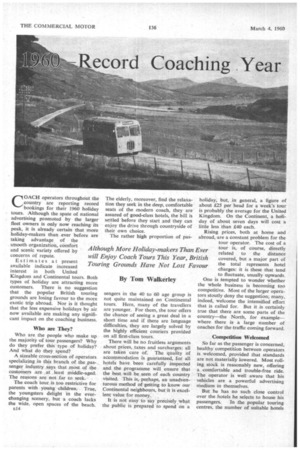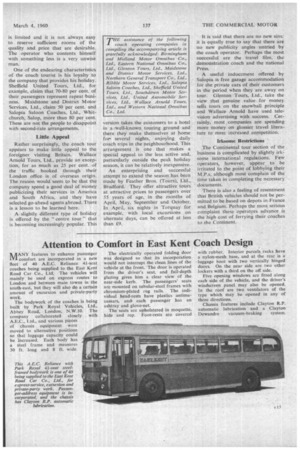Record Coaching Year
Page 56

Page 57

If you've noticed an error in this article please click here to report it so we can fix it.
By Tom Walkerley
COACH operators throughout the country are reporting record bookings for their 1960 holiday tours. Although the spate of national advertising promoted by the larger fleet owners is only now reaching its peak, it is already certain that more holiday-makers than ever before are taking advantage of the smooth organization, comfort and scenic variety offered by concerns of repute.
Estimates at present available indicate increased interest in both United Kingdom and Continental tours. Both types of holiday are attracting more customers. There is no suggestion that the popular British touring grounds are losing favour to the more exotic trip abroad. Nor is it thought that the less expensive holidays by air now available are making any significant impact on the coaching business.
Who are They?
Who are the people who make up the majority of tour passengers? Why do they prefer this type of holiday? And what do they spend?
A sizeable cross-section of operators specializing in this branch of the passenger industry says that most of the customers are at least middle-aged; The reasons are not far to seek.
The coach tour is too restrictive for parents with yung children. True, the youngsters delight in the everchanging scenery, but a coach lacks the wide, open spaces of the beach. The elderly, moreover, find the relaxation they seek in the deep', comfortable seats of the modern coach, they are assured of good-class hotels, the bill is settled before they start and they can enjoy the drive through countryside of their own choice.
The rather high proportion of pas sengers in the 40 to 60 age group is not quite maintained on Continental tours. Here, many of the travellers are younger. For them, the tour offers the chance of seeing a great deal in a short time and if there are language difficulties, they are largely solved by the highly efficient couriers provided on all first-class tours.
There will be no fruitless arguments about prices, taxes and surcharges: all are taken care of. The quality of accommodation is guaranteed, for all hotels have been carefully inspected and the programme will ensure that the best will be seen of each country visited. This is, perhaps, an unadventurous method of getting to know our Continental neighbours, but it is excellent value for money. , It is not easy to say precisely what the public is prepared to spend on a holiday, but, in general, a figure of about £25 per head for a week's tour is probably the average for the United Kingdom. On the Continent, a holiday of about seven days will cost a little less than £40 each.
Rising prices, both at home and abroad, are a constant problem for the tour operator. The cost of a tour is, of course, directly related to the distance covered, but a major part of the total represents hotel charges: it is these that tend to fluctuate, usually upwards.
One is tempted to wonder whether the whole business is becoming too competitive. Most of the larger operators stoutly deny the suggestion; many, indeed, welcome the intensified effort that is called for. But it is certainly true that there are some parts of the country—the North, for example— where there is a large number of coaches for the traffic coming forward.
Competition Welcomed .So far as the passenger is concerned, healthy, competition between operators is welcomed, provided that standards are not materially lowered. Most rolling stock is reasonably new, offering a comfortable and trouble-free ride. The operator is well aware that his vehicles are a powerful advertising medium in themselves.
But he has no such close control over the hotels he selects to house his passengers. In the popular touring centres, the number of suitable hotels is limited and it is not always easy to reserve sufficient rooms of the quality and price that are desirable. The operator who contents himself with something less is a very unwise man.
One of the endearing characteristics of the coach tourist is his loyalty to the company that provides his holiday. Sheffield United Tours, Ltd., for example, claim that 70-80 per cent, of their passengers represent repeat business. Maidstone and District Motor Services, Ltd., claim 50 per cent. and Salopia Saloon Coaches, Ltd., Whitchurch, Salop, more than 80 percent. These are not the people to disappoint with second-rate arrangements.
Little Appeal
Rather surprisingly, the coach tour appears to make little appeal to the foreigner visiting Britain. Wallace Arnold Tours, Ltd., provide an exception, for as much as 25 per cent. of the traffic booked through their London office is of overseas origin. The reason would seem to be that the company spend a good deal of money publicizing their services in America and South Africa, and they have selected go-ahead agents abroad. There is a lesson to be learned here.
A slightly different type of holiday is offered by the "centre tour" that is becoming increasingly popular. This
THE assistance of the following A coach operating companies in compiling the accompanying article is gratefully acknowledged: Birmingham and Midland Motor Omnibus Co., Ltd., Eastern National Omnibus Co., Ltd., Gienton Tours, Ltd., Maidstone and District Motor Services, Ltd., Northern General Transport Co., Ltd., Ribble Motor Services, Ltd., Salopia Saloon Coac-hes, Ltd., Sheffield United Tours, Ltd., Southdown Motor Services, Ltd., United Automobile Services, Ltd., Wallace Arnold Tours, Ltd., and Western National Omnibus Co., Ltd.
version takes the customers to a hotel in a ,welt-known touring ground and there they make themselves at home for several nights, enjoying daily coach trips in the neighbourhood. This arrangement is one that makes a special appeal to the less active and, particularly outside the peak holiday season, it can be relatively inexpensive.
An enterprising and successful attempt to extend the season has been made by Feather Bros. (Tours), Ltd., Bradford. They offer attractive tours at attractive prices to passengers over 55 years of age, in the months of April, May, September and October. In April, six nights in Torquay for example, with local excursions on alternate days, can be offered at less than £9. It is said that there are no new sins: it is equally true to say that there are no new publicity angles untried by the coach operator. Perhaps the most successful are the travel film, the demonstration coach and the national Press.
A useful inducement offered by Salopia is free garage accommodation for the private cars of their customers in the period when they are away on tour. Glenton Tours, Ltd., take the view that genuine value for money sells tours on the snowball principle and Wallace Arnold have used television advertising with success. Certainly, most companies are spending more money on glossier travel literature to meet increased competition.
Irksome Restrictions The Continental tour section of the business is complicated by slightly irksome international regulations. Few operators, however, appear, to be irritated to the point of lobbying their M.P.s, although most complain of the time taken in completing the necessary doCurnents.
There is also a feeling of resentment that British vehicles should not be permitted to be based on depots in France and Belgium. Perhaps the most serious complaint these operators advance is the high cost of ferrying their coaches to the Continent.




















































































































